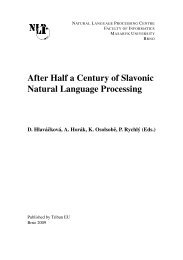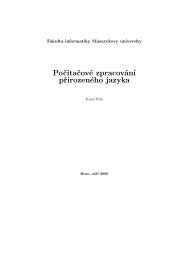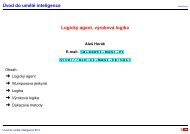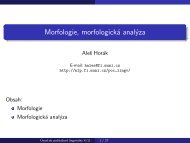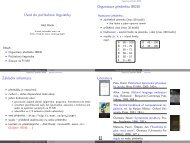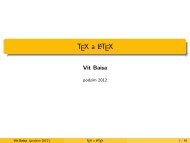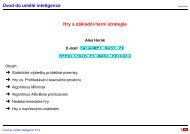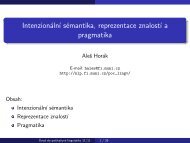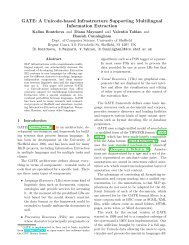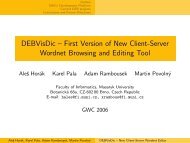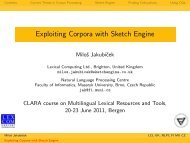Fast Morphological Analysis of Czech
Fast Morphological Analysis of Czech
Fast Morphological Analysis of Czech
Create successful ePaper yourself
Turn your PDF publications into a flip-book with our unique Google optimized e-Paper software.
8 Pavel Šmerk<br />
It should be noted that, in the contrary <strong>of</strong> what a reader might expect,<br />
the extreme difference in the speed <strong>of</strong> the diacritics restoration is the least<br />
surprising for us, because this task is implemented very poorly in ajka.<br />
The outputs <strong>of</strong> the old and new analyser are not quite identical: there are<br />
still some minor differences or even bugs on either side (mainly in an analysis<br />
<strong>of</strong> compound words), which will be addressed in the near future, but none <strong>of</strong><br />
these differences can notably affect the overall performance.<br />
As is obvious from the previous section, the new analyser majka has to have<br />
separate dictionary for each task — unlike ajka, which has only one common<br />
data, and even smaller. It is a kind <strong>of</strong> a tax for the speedup, but this several<br />
megabytes difference is not a problem for present-day computers.<br />
The Table 2 shows the extent <strong>of</strong> the compression <strong>of</strong> dictionaries. For other<br />
languages, Kowaltowski [3] reports 0.25 byte per one word-tag-lemma entry for<br />
Brazilian Portuguese and Daciuk [1] reports less then 0.15 byte per one wordlemma-tag<br />
entry for German and ca. 30 times better compression rate compared<br />
to gzip on that data. The presented results show similar or better compression<br />
for the <strong>Czech</strong> data as well<br />
Table 2. Statistical information on the data files <strong>of</strong> the new analyser majka<br />
type <strong>of</strong> dictionary # <strong>of</strong> entries size <strong>of</strong> entries size <strong>of</strong> dict. bytes/entry<br />
word (diacritics restor.) 13,609,590 186,154,068 3,263,374 0.240<br />
word → lemma 14,101,767 239,578,702 4,042,839 0.287<br />
word → lemma, tag 80,303,929 2,477,786,062 4,353,616 0.054<br />
word → all word forms 957,464,060 19,993,465,213 6,105,429 0.006<br />
In both tables, there are only tasks, which can be directly handled by ajka.<br />
Besides, we have also dictionaries for generation all word forms from lemma<br />
(which is a “subset” <strong>of</strong> word → all word forms) and for tasks lemma (or any<br />
word form) → word forms + tags, and lemma (or any word form) + tag → word<br />
forms, but these tasks are not supported by ajka.<br />
4 Conclusions and Future Work<br />
According to Gelbukh and Sidorov [2], the designer <strong>of</strong> a morphological analyzer<br />
for an inflective language has the following choice:<br />
– either generate all word forms and build a system with a large dictionary<br />
and a very simple ‘analysis" (just searching) algorithm,<br />
– or build a system with a much smaller dictionary <strong>of</strong> stems with information<br />
about possible endings, but with some more sophisticated algorithm<br />
(analysis through generation, in particular).<br />
For the inflective languages they strongly suggest the second option, because<br />
it allows to use a grammar model almost directly taken over from traditional



